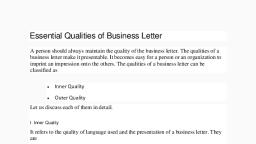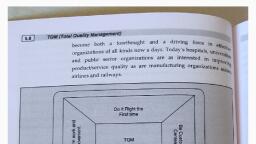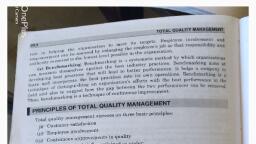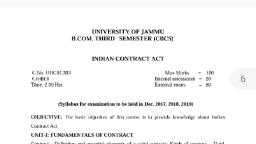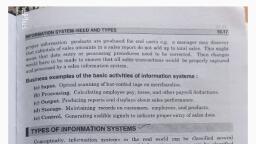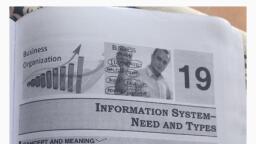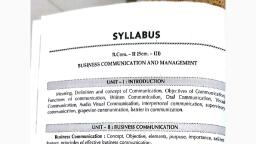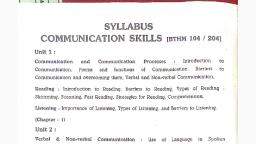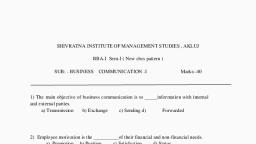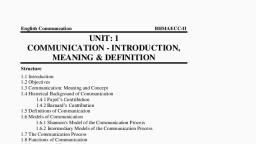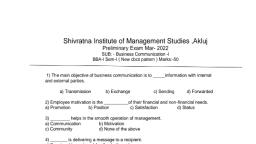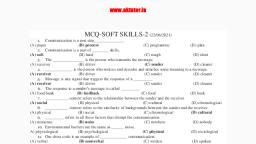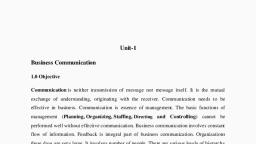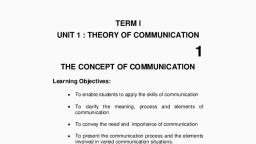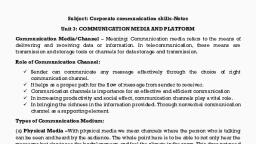Page 1 :
8 Factors Influencing the Business Communication are;, 1., 2., 3., 4., 5., 6., 7., 8., , Cultural Diversity., Misunderstanding of Message., Emotional Difference., Past Experiences., Educational and Intellectual Difference., Group Affiliations., Positional Differences among the Personnel., Functional Relationship between Sender and Receiver., , These are some factors that influence the meaning of business communication., 1. Cultural Diversity, When people from different cultural background communicate the chance of, misunderstanding and wrong interpretation of the message is higher. Large corporations and, MNC’s usually have a culturally diverse workforce., Also, they deal with many nationalities. Misunderstanding of messages can lead to a very, troubling situation for a company. Companies can take some measures to avoid this problem., 2. Misunderstanding of Message, Communication in business also fails when people assign different meanings to the same, word. Such a misunderstanding happens when technical words or jargons are used., Moreover, people may intentionally misinterpret the inner meaning of words., Misunderstanding of the message is a common thing in a communication but it could create a, problem for the company. So, messages must be prepared properly and there should be a, feedback system., 3. Emotional Difference, Emotions and feelings of the parties involved in communication significantly affect the, meaning of communication. For example, physicians are usually less emotional to the patient, than those of the relatives of the patients., 4. Past Experiences, The experience of previous communication strongly determines the effectiveness of further, communication between the same sender and receiver. If either of the parties has bitter, experience, further communication between them is likely to be ineffective., 5. Educational and Intellectual Difference, The difference in formal educational and intellectual level of sender and receiver also, influence the meaning of communication.
Page 2 :
If they have similar educational qualifications, communication will be effective. Because, they are likely to hold similar perception, understanding, feeling, thinking, view etc., 6. Group Affiliations, Differences in group-affiliation also affect communication in business. If sender and receiver, belong to different formal or informal groups, communication between., They may become less effective., For example, communication between trade union leaders and managers may fail simply, because of their hostile attitude to each other., Similarly, informal group relationship based on religion, gender, and region, age, etc. can, affect business communication., 7. Positional Differences among the Personnel, If sender and receiver hold different positions in the hierarchy, communication between them, may fail. Sometimes we see that for the purpose of maintaining the formality it the, organization, some people go too far., For example, superiors usually pay less attention to any message from their subordinates., Also, subordinates try to avoid any instruction from the superiors to avoid the workload and, responsibilities., 8. Functional Relationship between Sender and Receiver, The functional relationship between sender and receiver significantly affects the meaning of, communication in business. If sender and receiver belong to different functional departments, or areas, the receiver may not understand the sender’s message., For example, the finance manager may not clearly understand the message of the product, design manager; quality control manager may not understand the message of accountants., Business communication is the expression, channeling, receiving and interchanging of ideas, in the commerce and industry. In many ways, the meaning of business communication can be, an influence. This influence can be positive or negative.

